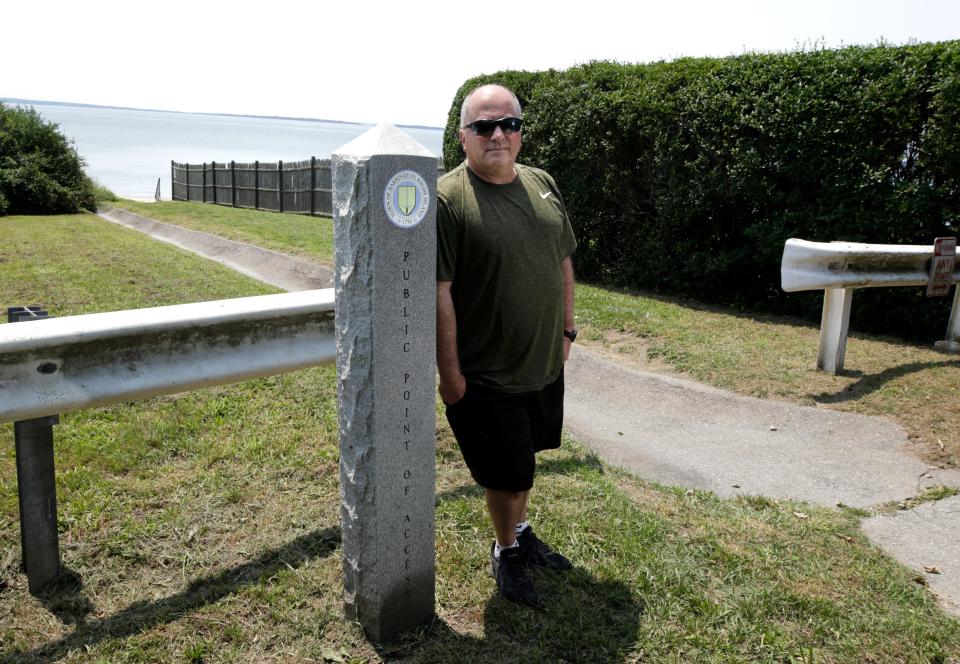Ken Block went looking for voter fraud in the 2020 election. Here's what he found.
Early in his new book about the 2020 presidential election, Rhode Island's Ken Block draws on his own gubernatorial campaign for perspective on how Donald Trump could have, in another world, handled his loss to Joe Biden.
"I conceded the race to someone I would rather have punched in the nose," Block writes, referring to the 2014 Republican primary against then-Cranston Mayor Allan Fung. "I lost with as much grace as possible. I knew that life would go on."
In "Disproven: My Unbiased Search for Voter Fraud for the Trump Campaign, the Data that Shows Why He Lost, and How We Can Improve Our Elections," Block recounts one of the first things the Trump campaign did in 2020 instead of conceding: searching for voter fraud in hopes of reversing the outcome.
Block was called on by the Trump campaign to find voter fraud
Block, a data analyst and owner of Simpatico Software Systems, had a unique vantage point to evaluate the blizzard of election fraud allegations that emerged after the vote – and the federal subpoenas to prove it.
The day after the Nov. 3 election, with votes still being counted and many states still too close to call, the Trump campaign called Block at his Barrington home and asked if he would like a job searching for voter fraud.
"Somebody was going to do this work. That person should do the work honestly, thoroughly, and most importantly, impartially," Block recounts telling his daughter as he prepared to take the job.
"This project represented a unique opportunity — the chance to perform a nationwide audit of election data with a large budget and the data-gathering resources of the Republican National Committee," he goes on. "The job, done well, would be about something more than the candidate. It would be about the process."

Dead ends, cold water and conspiracy theories
Unique as it was, the job Block describes through 300 pages of "Disproven" involves almost exclusively running down dead ends and throwing cold water on unlikely conspiracy theories.
There was the claim that in Nevada, more than 16,000 voters had also cast ballots in another state. And the allegations that more than 740,000 people in Wisconsin had voted twice. And an uncertain number of dead Pennsylvanians had cast a ballot.
As Block has already told the media and federal prosecutors, none of it checked out.

What's in the book?
In addition to the resources and opportunity to do an unparalleled deep dive into election data, a lifelong interest, Block also received around $755,000 from the Trump campaign.
And he got the material, surprisingly not covered by a nondisclosure agreement, that would turn into "Disproven."
Roughly a third of the book describes Block's data work for Trump, a third plunges deep into the election results to explain why Trump lost and another third outlines Block's prescriptions for making American elections more secure.
There are a few Rhode Island anecdotes.
There's a whole chapter dedicated to his successful campaign to eliminate the master lever.
While he never found evidence of significant voter fraud against Trump, Block flags data he says "hints at a broader problem but cannot take it beyond a hint."
One example he offers is the share of recently registered 2016 Central Falls voters without Personally Identifying Information, either a driver’s license or Social Security number, in their registrations.
Overall, Central Falls was in the middle of the pack for voters without personally identifying information that year, but counting only registrations made after the Help America Vote Act mandated it, Block said the city rose to more than 20% without the information, more than double the share in most other communities.
"Although I publicized this finding, no one did anything with it, which is not surprising given how controversial anything to do with enforcing existing voting rules has become," he writes.
Block says one of the things that made him want to write the book was watching in 2020 as "Rhode Island candidates I knew began repeating the false claim that voter fraud had caused their own losses in the 2020 election cycle."
Specifically, he calls out former Rhode Island state representative and congressional candidate Robert Lancia of Cranston.
Block's records, testimony used in court cases after the election
Investigators working on special council Jack Smith's case against Trump for attempting to overturn the election subpoenaed Block's records.
He was also subpoenaed in Georgia election worker Ruby Freeman's defamation case against Trump lawyer Rudy Giuliani, for which Giuliani was ordered to pay nearly $150 million.
And he was interviewed and subpoenaed in the Fulton County, Georgia case brought by District Attorney Fani Willis, against Trump for trying to “find 11,780 votes."
But he has not had to testify in any Trump-related cases, at least not yet.
"For the legal matters that are still pending, they're both kind of in suspended animation," Block told The Journal in a phone interview. "So whether or not I take part in those things is anybody's guess."
Block's work analyzing voting across the country over multiple elections has convinced him that the United States would benefit from greater standardization across jurisdictions and, ideally, automatic voter registration at the federal level.
How much do the rules vary from state-to-state?
"I use the example of what happens to someone's vote if they vote early and then die before election," he said. "And the answer to that question is it depends on where they live, which is a terrible answer. If you live in Michigan, your vote gets canceled. If you live in Rhode Island, your vote counts."
This article originally appeared on The Providence Journal: Trump's search for voter fraud in 2020 election re-told in new book
